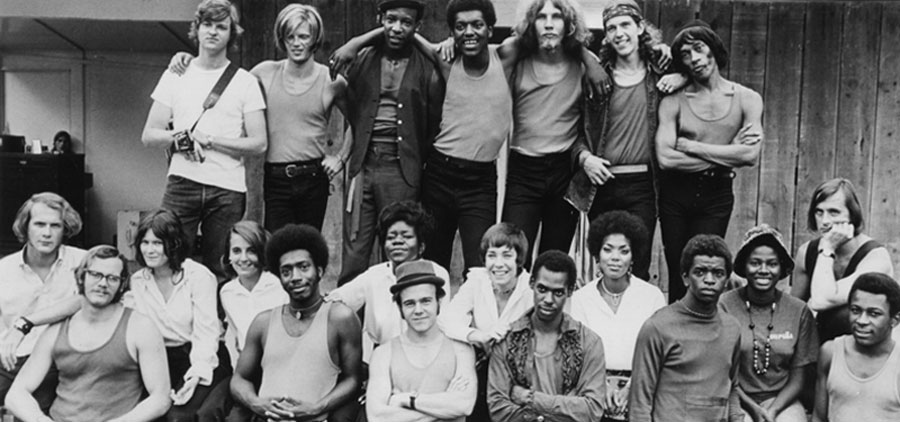Pictured above: Free Street Theater’s original 1969 company ensemble/Photo: Provided by Free Street Theater
Turn to the news and it’s sometimes unclear what decade we are living in. Racism continues to lie at the foundation of our country. Very few theater artists and groups would think theater was and is the way to solve it.
But in 1969, birthed out of the riots and protests following the assassinations of Martin Luther King Jr. and Bobby Kennedy, Free Street Theater was created. Founded by Patrick Henry, a white dude on staff at the Goodman School of Drama, this initiative started as an outreach program. It could have been a formula for white saviorship as his mission was to bring theater to underserved neighborhoods in Chicago. But in an unprecedented move—one that was radical for the time—the ensemble was made of up white and Black artists. And, rather than confine themselves to a brick and mortar location, Free Street Theater’s “showmobile” traveled around Chicago, bringing free theater quite literally to the streets and parks of Chicago.
Some may forget (or ignore) that Free Street Theater is a pioneer on many fronts: utilizing a free and pay-what-you-can model; exclusively working on pieces by, for, in, with, and about communities of color; providing childcare to artists and audiences, and paying competitive stipends to all artists for their labor.
Though a theater that caters to the marginalized may find itself in the margins, Free Street Theater is an ever-present part of the Chicago theater landscape—especially after opening their Storyfront space in Back of the Yards. To claim otherwise is harmfully irresponsible as the continued erasure of work by, for, in, with, about people of color contributes to the overall racist system by which this country was founded. Yet, as we saw earlier this month, the Chicago Tribune published an article penned by theater critic and arts journalist Chris Jones that did exactly that. What transpired afterward was a community of backlash—one loud enough to get an erroneously and insulting headline changed.
Many took to Facebook, including all three of the women currently running Free Street Theater: Artistic Director Coya Paz, Director of Production and Community Relations Melissa Duprey, and Director of Youth Programs and Development Katrina Dion.
For them, this situation is dire. The loss of arts coverage perpetuates erasure. Writing is what stands the test of time. Archives preserve so much of what is actually so ephemeral—and Free Street Theater knows this, especially after re-building their website from scratch after their host went out of service without notice. The historic Free Street Theater’s legacy is wide-reaching and they are STILL HERE (This also happens to be the working title for their 50th-anniversary project coming this summer).
So, how could a traveling theater company of almost 50 years survive on a free/pay-what-you-can model and little arts coverage? Well, Free Street Theater is a survivor—like the women who run it and the community they serve. When you look deeper into the backgrounds of these women, it is no surprise that their dedication to accessibility and activism in the arts has inspired other organizations to adopt similar (if not bootlegged) practices. Paz, a daughter to activist/organizers; DuPrey, an Afro-Latina Teatro Luna veteran, and Dion, a student/mentee of the award-winning theater artist Ricardo Gamboa. Each brings critical generosity and a commitment to the idea that theater is for everyone.
It’s time Free Street Theater received credit where credit is due. What can we do to combat this erasure? Show up and support them. If Chicago truly desires theater that is ethically made, sustainable and accessible, we must acknowledge the legacy of Free Street Theater and join them in their fight for theater for all.
・・・
Free Street Theater is currently fundraising for a matching grant of $15,000, a first in their nearly 50-year history. If you have the means, click here to support their radical endeavors. More information can be found through freestreet.org.












Be First to Comment